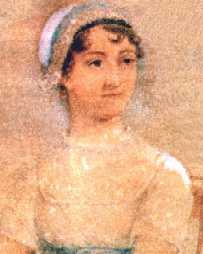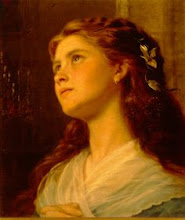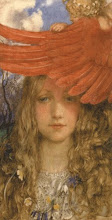Jane Austen Born: 16-Dec-1775
Born: 16-Dec-1775
Birthplace: Steventon, Hampshire, England
Died: 18-Jul-1817
Location of death: Winchester, England
Cause of death: unspecified
Remains: Buried, Winchester Cathedral
Gender: Female
Race or Ethnicity: White
Occupation: Author
Nationality: England
Executive summary: Pride and Prejudice
English novelist, born on the 16th of December 1775 at the parsonage of Steventon, in Hampshire, a village of which her father, the Rev. George Austen, was rector. She was the youngest of seven children. Her mother was Cassandra Leigh, niece of Theophilus Leigh, a dry humorist, and for fifty years master of Balliol, Oxford. The life of no woman of genius could have been more uneventful than Miss Austen's. She did not marry, and she never left home except on short visits, chiefly to Bath. Her first sixteen years were spent in the rectory at Steventon, where she began early to trifle with her pen, always jestingly, for family entertainment. In 1801 the Austens moved to Bath, where Mr. Austen died in 1805, leaving only Mrs. Austen, Jane and her sister Cassandra, to whom she was always deeply attached, to keep up the home; his sons were out in the world, the two in the navy, Francis William and Charles, subsequently rising to admiral's rank. In 1805 the Austen ladies moved to Southampton, and in 1809 to Chawton, near Alton, in Hampshire, and there Jane Austen remained until 1817, the year of her death, which occurred at Winchester, on July 18th, as a memorial window in the cathedral testifies.
During her placid life Miss Austen never allowed her literary work to interfere with her domestic duties: sewing much and admirably, keeping house, writing many letters and reading aloud. Though, however, her days were quiet and her area circumscribed, she saw enough of middle-class provincial society to find a basis on which her dramatic and humorous faculties might build, and such was her power of searching observation and her sympathetic imagination that there are not in English fiction more faithful representations of the life she knew than we possess in her novels. She had no predecessors in this genre. Miss Austen's "little bit (two inches wide) of ivory" on which she worked "with so fine a brush" -- her own phrases -- was her own invention.
Her best known, if not her best work, Pride and Prejudice, was also her first. It was written between October 1796 and August 1797, although, such was the blindness of publishers, not issued until 1813, two years after Sense and Sensibility, which was written, on an old scenario called "Eleanor and Marianne", in 1797 and 1798. Miss Austen's inability to find a publisher for these stories, and for Northanger Abbey, written in 1798 (although it is true that she sold that manuscript in 1803 for £10 to a Bath bookseller, only, however, to see it locked away in a safe for some years, to be gladly resold to her later), seems to have damped her ardor; for there is no evidence that between 1798 and 1809 she wrote anything but the fragment called "The Watsons", after which year she began to revise her early work for the press. Her other three books belong to a later date -- Mansfield Park, Emma and Persuasion being written between 1811 and 1816. All her works were initially anonymous, agreeably to their author's retiring disposition.
Although Pride and Prejudice is the novel which in the mind of the public is most intimately associated with Miss Austen's name, both Mansfield Park and Emma are finer achievements -- at once riper and richer and more elaborate. But the fact that Pride and Prejudice is more single-minded, that the love story of Elizabeth Bennet and D'Arcy is not only of the book but is the book (whereas the love story of Emma and Mr. Knightley and Fanny Price and Edmund Bertram have parallel streams), has given Pride and Prejudice its popularity above the others among readers who are more interested by the course of romance than by the exposition of character. Entirely satisfactory as is Pride and Prejudice so far as it goes, it is, however, thin beside the niceness of analysis of motives in Emma and the wonderful management of two housefuls of young lovers that is exhibited in Mansfield Park.
It has been generally agreed by the best critics that Miss Austen has never been approached in her own domain. No one indeed has attempted any close rivalry. No other novelist has so concerned herself or himself with the trivial daily comedy of small provincial family life, disdaining equally the assistance offered by passion, crime and religion. Whatever Miss Austen may have thought privately of these favorite ingredients of fiction, she disregarded all alike when she took her pen in hand. Her interest was in life's little perplexities of emotion and conduct; her gaze was steadily ironical. The most untoward event in any of her books is Louisa's fall from the Cobb at Lyme Regis, in Persuasion; the most abandoned, Maria's elopement with Crawford, in Mansfield Park. In pure ironical humour Miss Austen's only peer among novelists is George Meredith, and indeed Emma may be said to be her Egoist, or the Egoist his Emma. But irony and fidelity to the fact alone would not have carried her down the ages. To these gifts she allied a perfect sense of dramatic progression and an admirably lucid and flowing prose style which makes her stories the easiest reading.
Recognition came to Miss Austen slowly. It was not until many decades later that to read her became a necessity of culture. But she is now firmly established as an English classic, standing far above Miss Burney (Madame d'Arblay) and Maria Edgeworth, who in her day were the popular women novelists of real life, while Mrs. Radcliffe and "Monk" Lewis, whose supernatural fancies Northanger Abbey was written in part to ridicule, are no longer anything but names. Although much delayed in her fame, Miss Austen had always her panegyrists among the best intellects -- such as Coleridge, Tennyson, Macaulay, Scott, Sydney Smith, Disraeli and Archbishop Whately, the last of whom may be said to have been her discoverer. Macaulay, whose adoration of Miss Austen's genius was almost idolatrous, considered Mansfield Park her greatest feat; but many critics give the palm to Emma. Disraeli read Pride and Prejudice seventeen times. Scott's testimony is often quoted: "That young lady had a talent for describing the involvements, feelings and characters of ordinary life which is to me the most wonderful I have ever met with. The big bow-wow I can do myself like any one going; but the exquisite touch which renders commonplace things and characters interesting from the truth of the description and the sentiment is denied to me."
Father: Rev. George Austen (clergyman, b. 1731, d. Jan-1805)
Mother: Cassandra Leigh (b. 1739, d. 1827)
Brother: Frank
Brother: Charles
Sister: Cassandra
Brother: Edward
Brother: Henry
Boyfriend: Harris Bigg-Wither (broken engagement)
Is the subject of books:
A Portrait of Jane Austen, 1978, BY: David Cecil
Author of books:
Sense and Sensibility (1811, novel)
Pride and Prejudice (1813, novel)
Mansfield Park (1814, novel)
Emma (1816, novel)
Northanger Abbey (1818, novel, posthumous)
Persuasion (1818, novel, posthumous)


 The waves beside them danced, but they
The waves beside them danced, but they For oft when on my couch I lie
For oft when on my couch I lie


 Born:
Born: 


















